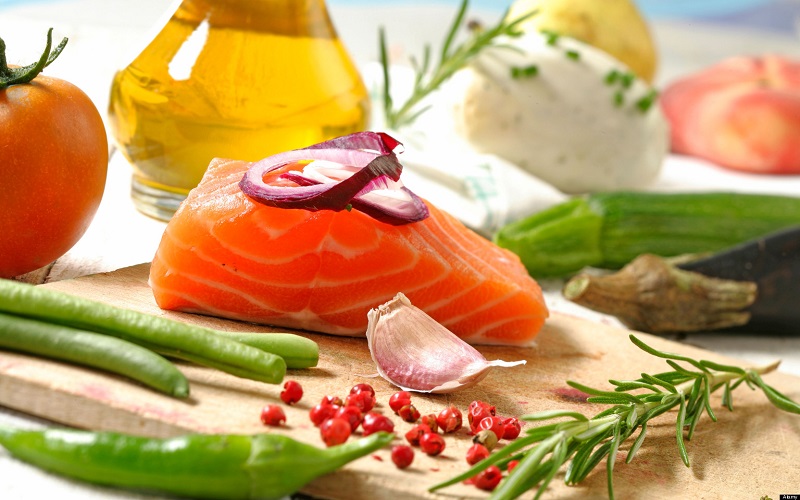The Mediterranean diet has gained popularity in many countries, and for good reason. Numerous studies have shown that adopting this style of eating can reduce the risk of mortality and prevent cardiovascular disease, while also effectively improving one’s weight. But what exactly is the Mediterranean diet, and what are its benefits? Let’s explore these questions and more in the article below.
1 What is the Mediterranean Diet?
The Mediterranean diet originates from the dietary traditions of countries bordering the Mediterranean Sea, such as Greece, France, Italy, and Spain. What sets this diet apart from others is its approach to fat consumption. The Mediterranean diet allows for higher fat intake, as long as you choose the right types of fats. Additionally, this diet does not require strict calorie counting or restrictive measures.
One of the key advantages of this diet is the freedom from calculating calorie intake or restricting specific nutrients. Instead, each meal should prioritize healthy foods such as fruits, vegetables, and whole grains, while reducing products derived from red meat and refined sugars.
 The Mediterranean Diet
The Mediterranean Diet
2 Basic Principles of the Mediterranean Diet
While there is no definitive list of foods included in the Mediterranean diet, the following principles provide a solid framework:
- Emphasized Food Groups: Fruits (including apples, bananas, strawberries, grapes, and more), vegetables (such as onions, broccoli, spinach, and kale), legumes (like lentils, chickpeas, and red beans), nuts and seeds (almonds, pistachios, walnuts, and pumpkin seeds), whole grains, fish, seafood, and pure oils like olive oil.
- Moderated Food Groups: Red meats, including beef, goat, and lamb.
- Food Groups in Moderation: Dairy products, poultry, eggs, and so on.
- Food Groups to Avoid: Refined grains, refined oils, sugary foods and beverages, and processed foods.
 Basic Principles of the Mediterranean Diet
Basic Principles of the Mediterranean Diet
3 Benefits of the Mediterranean Diet
Adopting the Mediterranean diet offers a plethora of health benefits, especially when combined with regular exercise. It has been shown to reduce the risk of cardiovascular disease and other chronic illnesses, including:
- Type 2 diabetes
- Parkinson’s disease
- Alzheimer’s disease
- Certain types of cancer, such as breast cancer
 Benefits of the Mediterranean Diet
Benefits of the Mediterranean Diet
4 Recommended Foods in the Mediterranean Diet
When following the Mediterranean diet, prioritize fresh, unprocessed foods such as:
- Fruits: Apples, bananas, pears, strawberries, grapes, avocados, peaches, and more.
- Vegetables: Onions, broccoli, spinach, kale, and so on.
- Roots and Tubers: Potatoes, sweet potatoes, yams, and more.
- Legumes: Green beans, peanuts, red beans, chickpeas, and lentils.
- Nuts and Seeds: Almonds, pistachios, walnuts, macadamia nuts, cashews, and so on.
- Whole Grains: Brown rice, quinoa, oats, barley, rye, and whole wheat products.
- Poultry Products: Chicken, duck, eggs, and so forth.
- Seafood: Fish such as salmon, sardines, tuna, shrimp, and so on.
- Dairy Products: Fresh milk, cheese, and yogurt.
- Herbs and Spices: Basil, rosemary, thyme, oregano, cinnamon, and more.
- Healthy Fats: Avocado oil, extra virgin olive oil, and so forth.
 Recommended Foods in the Mediterranean Diet
Recommended Foods in the Mediterranean Diet
In addition to the above, it’s beneficial to consume green tea daily. Moderate consumption of red wine, beer, or liquor is also acceptable.
5 Foods to Avoid in the Mediterranean Diet
When adhering to the Mediterranean diet, it’s important to limit or avoid the following:
- Refined Grains: White bread, pasta made from refined wheat, and so on.
- Sugary Foods: Candy, cookies, pastries, and other sweets.
- Refined Oils: Canola oil, cottonseed oil, and refined soybean oil.
- Trans Fats: Margarine, and processed foods.
- Processed Meats: Pre-packaged deli meats, bacon, and smoked or cured sausages.
 Foods to Avoid in the Mediterranean Diet
Foods to Avoid in the Mediterranean Diet
6 Sample Mediterranean Diet Menu
If you’re planning to adopt the Mediterranean diet, here’s a weekly menu to get you started:
Monday
- Breakfast: Yogurt mixed with walnuts, almonds, or fruit.
- Lunch: Mediterranean-style cooked meal.
- Dinner: Brown rice with grilled salmon and vegetables.
Tuesday
- Breakfast: Oatmeal with raisins.
- Lunch: Tuna salad with olive oil.
- Dinner: Salad with tomatoes, olives, and cheese.
Wednesday
- Breakfast: Fried eggs with tomatoes and onions.
- Lunch: Whole grain bread with fresh vegetables and cheese.
- Dinner: Mediterranean-style pasta.
Thursday
- Breakfast: Yogurt mixed with strawberries and oatmeal.
- Lunch: Whole grain bread, fresh vegetables, and hummus.
- Dinner: Tuna salad with olive oil and fruit for dessert.
Friday
- Breakfast: Two boiled eggs fried in olive oil.
- Lunch: Yogurt mixed with strawberries, oatmeal, and nuts like almonds and walnuts.
- Dinner: Salad with grilled lamb and baked potatoes.
Saturday
- Breakfast: Oatmeal with raisins, apples, and nuts.
- Lunch: Whole grain bread with assorted vegetables.
- Dinner: Vegetarian pizza made with whole grains, cheese, and vegetables of your choice, drizzled with olive oil.
Sunday
- Breakfast: Fried eggs with vegetables and olive oil.
- Lunch: Vegetarian pizza made with whole grains, cheese, and your choice of vegetables.
- Dinner: Grilled chicken with baked potatoes and vegetables.
 Sample Mediterranean Diet Menu
Sample Mediterranean Diet Menu
In this article, we’ve explored the Mediterranean diet, its benefits, and how to implement it. We hope this information helps you construct a healthy diet plan for yourself and your family.
Source: Vinmec International General Hospital
































